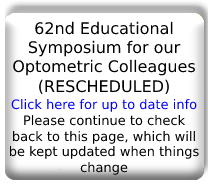Northern New Jersey Eye Institute on ZocDoc
ECP (Endoscopic Cyclophotocoagulation) & Cataract Surgery
If you were scheduled for Cataract Surgery, and you also have Glaucoma, your surgeon may have asked you to consider a combined Cataract Glaucoma procedure. This video is intended to inform you about the treatment for Glaucoma called Endoscopic CycloPhotocoagulation or ECP. ECP is a relatively simple procedure to perform and is often recommended by surgeons for Glaucoma Patients who are in need of having their cataract removed. With over 50 thousand surgeries performed in the last 10 years, ECP has been shown to be both safe and effective in decreasing pressure in the eye and reducing or even eliminating the need for Glaucoma medications.
As a major cause for blindness throughout the world, Glaucoma is a disease of the eye that results in a progressive damage to the optic nerve.
Your eye contains a nourishing fluid called Aqueous Humour. This liquid is produced by a ring of tissue knows as the Ciliary processes which lie in the underside of the iris. The shape of your eye is maintained as the fluid collects and fills the ocular chambers. It ultimately exits through a small channel in the edge of the iris thus preserving correct ocular pressure. Glaucoma develops when more fluid accumulates in the eye than it is able to drain. The drainage channel become blocked and aqueous humour can no longer flow to the outside. This build up of liquid raises the internal pressure of your eye. It’s this increase of intraocular pressure or IOP that causes damage to the optic nerve. If this damage continues, it will lead to loss of vision and without treatment, Glaucoma can cause total permanent blindness within a few years. Glaucoma is commonly treated with eye drop medications which are quite often prescribed in various combinations. These medications either reduce the formation of the fluid in the eye or increase the outflow of the fluid from the eye. While many glaucoma patients are adequately treated with medications, some continue to experience an increase in intraocular pressure. These patients may benefit from noninvasive laser procedure or surgical procedures. Both of which are designed to lower IOP.
Surgical procedures, however, vary, and their use depends on the type and severity of the glaucoma. Almost 2 decades ago, a form of glaucoma surgery was developed in order to approach the problem in a way never before possible. An approach that places the perspective of the surgery inside the eye directly in front of the Ciliary processes. This revolutionary procedure is called Endoscopic CycloPhotocoagulation or ECP.
During ECP, a surgeon uses a tiny endoscopic laser probe which combines imaging and laser delivery. This limits the ciliary processes’ ability to produce aqueous. Numerous studies have shown that ECP is safe and effective at lowering eye pressure and either eliminating or reducing the need for glaucoma medications. The ECP procedure is usually performed on Glaucoma Patients who have developed cataracts and are undergoing cataracts surgery. In this combined surgery, your surgeon will make a small incision to remove the cataracts and insert a new artificial lens. Then he will insert the tiny endoscopic laser probe through the same incision made for your cataract removal. once inside the eye, the probe will be guided by the surgeon using a video monitor to locate a ciliary processes and deliver laser treatment. The entire procedure is relatively quick. Most surgeons reports that ECP adds only about 5-10 minutes to the cataract procedure. The combined cataract ECP surgery is also convenient as it requires no more follow up visits than for cataract surgery alone. After your combined cataract ECP surgery, your vision should improve immediately, however, it make take a few days or a few months for your pressure to drop enough to eliminate or reduce your glaucoma medications.
In general, patients can resume normal daily activities the day after surgery. While there are risks to any surgical procedure, studies have shown that when ECP is performed directly after cataract surgery, it does not cause any additional significant complications beyond those typically seen with cataract surgery. Overall ECP is successful in controlling IOP in about 90 percent of patients and most diminish or eliminate their need for Glaucoma medications long term.
If you suffer from uncontrolled Glaucoma or if you’re having a cataract surgery and are taking Glaucoma medications, Endoscopic CycloPhotocoagulation may be the treatment of choice.
Thank you

"Dr. Crane is one of less than 100 doctors in the United States to be able to bring this new technology to his patients."
"Dr. Crane is one of less than 100 doctors in the world who have been approved to participate in the iDose FDA trial"
iDose exchange
"Dr. Crane is one of less than 15 doctors in the United States to perform this procedure for his patients."
"Dr. Crane is one of less than 15 doctors in the world who were approved to participate in the iDose exchange FDA trial"
Infinite
"Dr. Crane is one of less than 15 doctors in the United States who were able to bring this new technology to his patients."
"Dr. Crane is one of less than 15 doctors who were approved to participate in the iStent Infinite FDA trial"
General
Eye Injuries From Paintball Guns, Air Guns and Other Projectile Toys
FDA issues warning for contaminated eye drops that can cause infection.
"Dr. Crane and Glaukos have a long history of working together on several medical device and pharmaceutical studies. He has been able to offer these technologies to his patients and the products from these studies have progressed to help treat hundreds of thousands of patients in need."
Employment Opportunity: Optometrist in Essex, Morris, and Union Counties
Dr. Crane Top Doctor 2019
Congratulations to Dr. Crane for being the 2nd surgeon in the United States to perform a new treatment for Glaucoma. We hope this treatment will bring further advances in the care of our glaucoma.
ASCRS Thanks Dr. Crane for Volunteer Work
Dr. Spier Named to OSN's Premier Surgeon 300
Dr. Spier: Weekend Comedian
Dionne Warwick on Dropless Surgery [VIDEO] (Surgery Performed by Dr. Spier)
Dr. Crane and Staff congratulate their patient Dr. William Scaife
Dr. Crane named to the ASCRS Council of 100
 Dr Crane meets one of his favorite Sharks, Daymond John, at a book signing!
Dr Crane meets one of his favorite Sharks, Daymond John, at a book signing!














